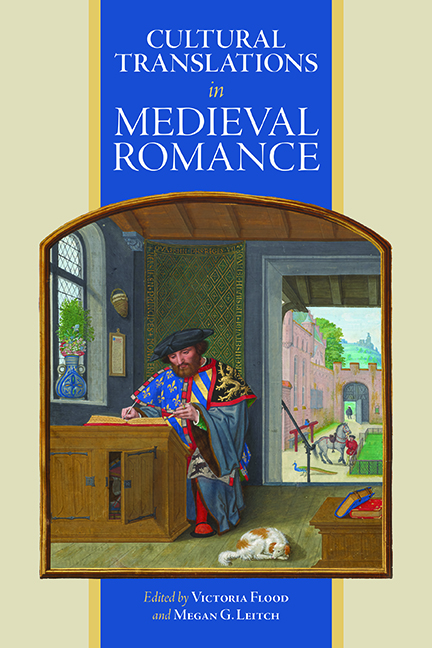Book contents
- Frontmatter
- Contents
- List of Contributors
- List of Abbreviations
- Introduction Insular Romance in Translation: New Approaches
- 1 Romantic Wales: Imagining Wales in Medieval Insular Romance
- 2 ‘Something remains which is not open to my understanding’: Enigmatic Marvels in Welsh Otherworld Narratives and Latin Arthurian Romance
- 3 The Supernatural Company in Cultural Translation: Dafydd ap Gwilym and the Roman de la Rose Tradition
- 4 Women and Werewolves: William of Palerne in Three Cultures
- 5 ‘Better a valiant squire than a cowardly knight’: Gender in Guruns strengleikr (The Lay of Gurun)
- 6 ‘Vinegar upon Nitre’? Walter Map’s Romance of ‘Sadius and Galo’
- 7 The Three Barriers to Closure in Hue de Rotelande’s Ipomedon and the Middle English Translations
- 8 Trojan Trash? The Seege or Batayle of Troye and the Learning of ‘Popular’ Romance
- 9 Poaching Romance: Fan Fiction Theory and Shared Medieval Narratives
- 10 Between Epic and Romance: The Matter of England and the Chansons de Geste
- 11 Geographies of Loss: Cilician Armenia and the Prose Romance of Melusine
- 12 ‘All this will not comfort me’: Romancing the Ballad in The Squire of Low Degree
- 13 Merchants in Shining Armour: Chivalrous Interventions and Social Mobility in Late Middle English Romance
- Index of Manuscripts
- General Index
- Miscellaneous Endmatter
Introduction - Insular Romance in Translation: New Approaches
Published online by Cambridge University Press: 07 October 2022
- Frontmatter
- Contents
- List of Contributors
- List of Abbreviations
- Introduction Insular Romance in Translation: New Approaches
- 1 Romantic Wales: Imagining Wales in Medieval Insular Romance
- 2 ‘Something remains which is not open to my understanding’: Enigmatic Marvels in Welsh Otherworld Narratives and Latin Arthurian Romance
- 3 The Supernatural Company in Cultural Translation: Dafydd ap Gwilym and the Roman de la Rose Tradition
- 4 Women and Werewolves: William of Palerne in Three Cultures
- 5 ‘Better a valiant squire than a cowardly knight’: Gender in Guruns strengleikr (The Lay of Gurun)
- 6 ‘Vinegar upon Nitre’? Walter Map’s Romance of ‘Sadius and Galo’
- 7 The Three Barriers to Closure in Hue de Rotelande’s Ipomedon and the Middle English Translations
- 8 Trojan Trash? The Seege or Batayle of Troye and the Learning of ‘Popular’ Romance
- 9 Poaching Romance: Fan Fiction Theory and Shared Medieval Narratives
- 10 Between Epic and Romance: The Matter of England and the Chansons de Geste
- 11 Geographies of Loss: Cilician Armenia and the Prose Romance of Melusine
- 12 ‘All this will not comfort me’: Romancing the Ballad in The Squire of Low Degree
- 13 Merchants in Shining Armour: Chivalrous Interventions and Social Mobility in Late Middle English Romance
- Index of Manuscripts
- General Index
- Miscellaneous Endmatter
Summary
The chapters collected in this volume explore the subject of translation, both linguistic and cultural, in relation to the composition, reception, and dissemination of romance across the languages of late medieval Britain, Ireland, and Iceland. This is a geographical and linguistic zone that we term, in line with its broader interdisciplinary usage, ‘Insular’, extending its application beyond the study of English romance, where ‘insular’ has referred primarily to English and French texts composed in England. The chapters included here are based on papers delivered at Cardiff University as part of the 2018 Romance in Medieval Britain conference – a series which has in recent years come to encompass a fuller geographical and linguistic range. This is a particularly welcome development, not least in the possibilities that this extended field presents for the connective and comparative study of a much translated and travelled genre, with an illuminating role to play in writing the history of pre-modern translation. The volume proposes a recentring, and extension, of our understanding of the corpus of medieval romance, which, although long considered extra-canonical, has over the previous decades acquired something approaching its own canon – a canon which we might now begin to unsettle, and of which we might ask new questions. In large part, this volume is aligned with broader endeavours to make multilingual and translated medieval content visible. This is not least within English studies – the dominant discipline to which this conference series, and its proceedings, generally speaks – which is now gradually expanding its engagement with romance's wider linguistic and cultural field(s).
This volume employs an extended definition of translation, beyond the purely linguistic. As Michelle Warren observes, translation studies has long regarded translation ‘less as a linguistic event and more as a manifestation of culture’. This perspective is of particular utility for medievalists, not least in its destabilisation of the hierarchical relationship between ‘original’ texts and translation. Warren extends her consideration of translation, in its cultural capacity, to what she terms ‘monolingual translatio’: single-language texts (in her examples, Middle English), written with an awareness of a broader cultural context in which translated texts circulate.
- Type
- Chapter
- Information
- Cultural Translations in Medieval Romance , pp. 1 - 20Publisher: Boydell & BrewerPrint publication year: 2022

